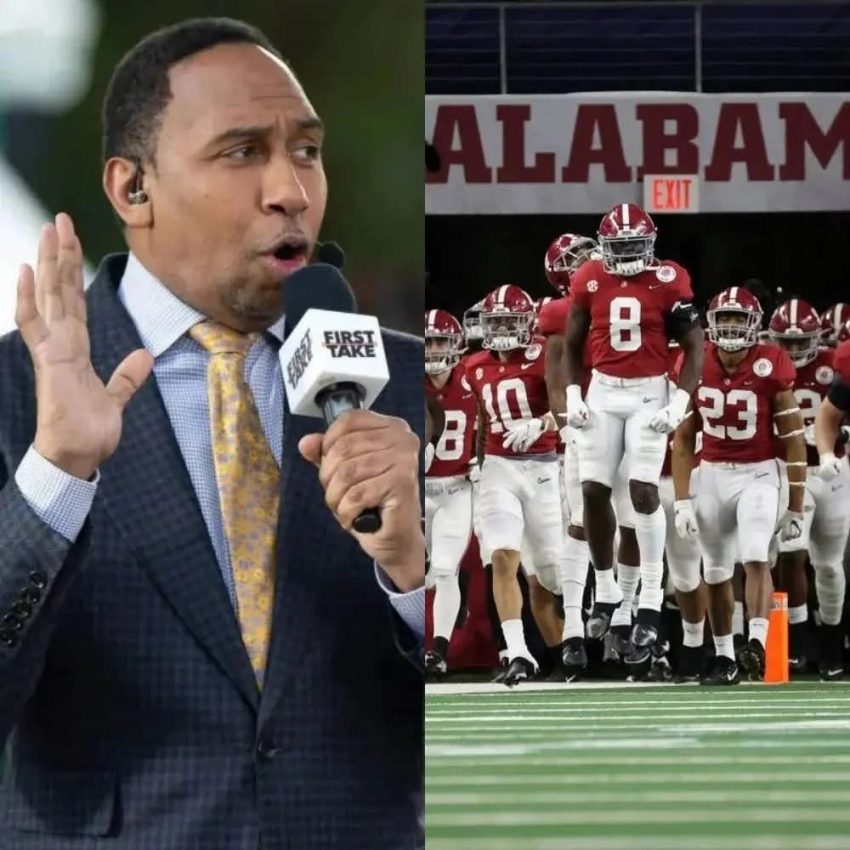Stephen A. Smith, a well-known and often outspoken ESPN commentator, has once again sparked debate with his latest remarks on college football. This time, he turned his attention toward one of the sport’s most dominant teams—the University of Alabama Crimson Tide.
Known for his bold takes and passionate opinions, Smith did not hold back in his latest critique of Alabama football. His comments have ignited discussions among fans and analysts, particularly due to the Crimson Tide’s sustained excellence under the leadership of legendary head coach Nick Saban.
Smith’s comments were made during an appearance on First Take, where he was asked to assess Alabama’s season and their consistent presence in the College Football Playoff (CFP) conversation. While the question was originally meant to focus on Alabama’s place in the playoff rankings, Smith quickly shifted into a heated rant about the program’s dominance. He openly expressed his frustration with the team’s continued success and the overwhelming media attention they receive year after year.
“Alabama makes me sick,” Smith stated. “Every season, they dominate, they get all the recognition, and it feels like no one else even has a chance. It’s not even about the players or the coach—it’s about the fact that Alabama gets all the love, and quite frankly, it’s getting old.”
His remarks reflect a sentiment shared by some college football fans who have grown weary of Alabama’s reign over the sport. Under Saban’s leadership, the Crimson Tide have become a permanent fixture in the national championship race, winning multiple titles and consistently producing top-tier NFL talent. Their success is virtually unparalleled in modern college football, and while many admire their excellence, others—like Smith—feel that their dominance has become tiresome.
Smith went on to call out the media and fans for perpetuating the narrative that Alabama is always the team to beat. He argued that the constant focus on the Crimson Tide often comes at the expense of other deserving programs. “We don’t give enough credit to other teams that are out there working just as hard,” he said. “All we hear about is Alabama. The moment they lose a game, it’s a national crisis. But if another team suffered the same loss, nobody would care.”
His frustration highlights a larger issue within college football: the perception that Alabama’s success has led to an imbalance in national discussions about the sport. While other programs, such as Clemson, Ohio State, and Georgia, have enjoyed their own periods of success, the conversation almost always circles back to Alabama. In many ways, the Crimson Tide have set a standard so high that it often overshadows the achievements of other teams.
Smith’s criticism isn’t just about Alabama winning games and championships—it’s about how the program is portrayed and prioritized by the media. He believes that Alabama’s overwhelming presence in college football discussions creates an unfair advantage, making it harder for other teams to get the recognition they deserve. While he acknowledges Alabama’s greatness, he questions whether the constant spotlight on them is making the sport less exciting.
“It’s the same story every year, and it’s boring,” Smith argued. “There are other teams that are just as talented—sometimes even better—but they don’t get the same level of attention because Alabama is always the main focus.”
Though his comments may seem harsh, they resonate with a portion of the college football fanbase that craves more variety in the sport’s elite programs. Many fans believe Alabama’s dominance has created a sense of inevitability, making the College Football Playoff less competitive. This has sparked conversations about whether the current playoff format, which favors the top-ranked teams, needs to be adjusted to create more opportunities for other programs.
However, Smith made it clear that his frustration is not directed at Alabama’s players or their head coach, Nick Saban. In fact, he acknowledged Saban’s brilliance and praised the talented athletes who have come through the program. His issue lies with how Alabama is perceived within the broader landscape of college football. He feels that the Crimson Tide’s success has reached a point where it diminishes the contributions of other teams striving for greatness.
Alabama fans, unsurprisingly, are likely to take offense at Smith’s remarks. Supporters of the Crimson Tide have long prided themselves on their team’s status as the gold standard of college football. With a history of winning championships, producing top NFL prospects, and consistently ranking among the best teams in the country, Alabama has built a legacy that its fans fiercely defend. Many believe the attention their team receives is well-deserved, as it reflects their sustained excellence over the years.
Despite the likely backlash, Smith’s comments contribute to a broader discussion about the state of college football. With Alabama’s continued dominance, the question remains: how long can other programs remain in the shadows? Teams like Georgia, Ohio State, and Michigan have emerged as formidable contenders, but Alabama remains the benchmark for success. Until another team consistently dethrones them, the Crimson Tide will continue to be the primary focus of college football conversations—whether people like it or not.
In the end, Smith’s declaration that “Alabama makes me sick” will likely be remembered as one of his more controversial takes. Whether fans agree or disagree with him, his comments reflect a reality that many in the college football world have considered: Alabama’s influence over the sport is undeniable. While their dominance is a testament to their greatness, it also raises questions about parity and excitement in the game. For now, Alabama remains the most talked-about program in college football, inspiring both admiration and frustration with every season.
